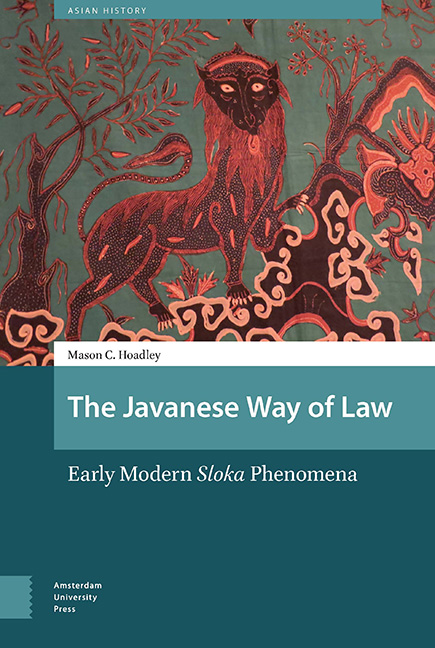7 - Vignettes and Practice
Published online by Cambridge University Press: 20 November 2020
Summary
Vignettes may seem to be figurative narratives employed to illustrate bookish constructs with tentative connections to law. Yet, when supplemented by a limited number of related ‘diverse components’ they provide context for the sloka phenomena within traditional Javanese law. From the view point of external scholarship, the concept of vignettes in the meaning of ‘a short descriptive essay or character sketch’ applies equally well to the narratives of cases resolved by Javanese courts vetted by Dutch East India Company officials. Information on the course of such cases is not something European officials of the time could have known through participating in institutions foreign to their own administrative praxis, let alone those conducted in a language rarely mastered by administrative personnel. Consequently, the information concerning the workings of the legal system and its law found in the Company archives constitutes second-hand sources. It was not gained from experiences of the reporters; it was received from local personnel, passed on to their superiors, and preserved in official reports. Under the circumstances can such material be considered more real than those found in Javanese textual traditions? By stating the obvious the intention is not to underrate the potential contribution of Dutch reports to the understanding Javanese law, but to point out that what is reported by European sources must be subjected to the same standards of logic and veracity as those of indigenous writings considered in this work.
This variant of ‘many ways to the prayer house’ sets the chapter's agenda. The first half focuses on textual vignettes. It should be noted that there is a possibility, at present unsubstantiated, that they are based on actual cases that over time have become textual illustrations of legal principles. In contrast ‘practice’, those few cases found in the Dutch Company archives dealt with in the second half of this chapter, are contextually alien contributions. However, when checked by the contents of information found in Javanese legal literature, they can provide valuable information.
Vignettes
Taken by themselves aksara, sinalokan, and prakara are difficult to understand without the insights provided by the vignettes in which they are embedded.
- Type
- Chapter
- Information
- Javanese Way of LawEarly Modern Sloka Phenomena, pp. 141 - 166Publisher: Amsterdam University PressPrint publication year: 2019

